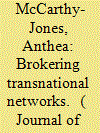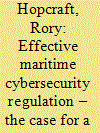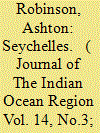| Srl | Item |
| 1 |
ID:
161465


|
|
|
|
|
| Summary/Abstract |
The current explosion of cocaine, illicit methamphetamine and fentanyl in the Asia Pacific is the result of increased collaboration between Chinese and Latin American organized crime groups operating across the Pacific littoral. These networks are connected through brokers who operate as channels between these discrete criminal. Recently, elements of these networks in the Pacific have begun to appear in the Indian Ocean region, demonstrating the cumulative reach of these criminal organizations. Australian law enforcement and intelligence officials will need to focus intelligence gathering activities on identifying key brokers in order to disrupt these criminal networks. Specific attention should be paid to emergent networks in the Indian Ocean which could prove to be the missing piece of the puzzle to understanding the scope and depth of these linked criminal organizations that operate across all four corners of the globe.
|
|
|
|
|
|
|
|
|
|
|
|
|
|
|
|
| 2 |
ID:
161466


|
|
|
|
|
| Summary/Abstract |
Ships and ports are increasingly connected to each other through cyberspace. This connectivity streamlines many aspects of maritime business, but also exposes maritime operators and administrations to new types of risk including hacking and outage. The maritime industry has been slow to realize the implications of this new environment within which it operates, and now lags behind other industries (like aviation) when it comes to cyber risk mitigation and regulation. We argue that the International Maritime Organisation (IMO), alongside its members, urgently needs to create robust and resilient cybersecurity regulations. We suggest that the IMO should consider creating a standalone Cyber Code, based on a framework created by previous IMO Codes such as the Polar Code. Since the IMO uses Codes as a legally binding instrument, this would help to ensure the continued safety and efficiency of the maritime industry in the face of threats from cyberspace.
|
|
|
|
|
|
|
|
|
|
|
|
|
|
|
|
| 3 |
ID:
161462


|
|
|
|
|
| Summary/Abstract |
There is a growing understanding among maritime security practitioners of the importance of Maritime Domain Awareness (MDA) as an essential enabler of maritime security. This article describes Australia’s efforts to develop an integrated national MDA system that brings together data and intelligence from a range of military and civil agencies and commercial sources to which a risk-based assessment is applied. This has become an essential tool to combat transnational maritime security threats in the Indian Ocean and elsewhere. But inherent limitations of national MDA systems are also pushing Australia and other countries to cooperate in trying to improve MDA. This paper then examines ways in which Australia can promote MDA cooperation in the Indian Ocean. It considers the effectiveness and limitations of current and proposed multilateral information sharing arrangements in the region. It concludes that Australia should primarily focus on working with selected Indian Ocean partners to enhance information sharing and help develop integrated national MDA systems.
|
|
|
|
|
|
|
|
|
|
|
|
|
|
|
|
| 4 |
ID:
161463


|
|
|
|
|
| Summary/Abstract |
The Indian Ocean Region (IOR) has become an area of critical strategic interest. It is also a region that contains a range of serious and evolving non-traditional security problems, including the problem of maritime terrorism. As a result, many IOR states have called for stronger pan-regional intelligence collaboration to assist in risk mitigation against such violent and destabilizing threats. This article explores the challenges involved in establishing an effective intelligence exchange network in a region characterized by mistrust, diversity and a lack of established security priorities and protocols. Building upon the success of the IOR’s joint counter-piracy operations, it will argue that a less burdensome network-based approach is needed that can concentrate on issue-specific competencies and commonalties among states. In particular, while not without limitations, a more loosely coordinated and informal network governance approach can enhance opportunities to improve information-sharing to address common maritime security challenges, such as maritime terrorism, among IOR and extra-regional states.
|
|
|
|
|
|
|
|
|
|
|
|
|
|
|
|
| 5 |
ID:
161460


|
|
|
|
|
| Summary/Abstract |
The Indian Ocean Rim (IOR), with nearly half the world's population by 2050, in geo-political terms, is moving away from being identified as the ‘Ocean of the South’ to the ‘Ocean of the Center’ and the ‘Ocean of the Future’ with a core position in terms of global security, data collection and information transfer that will increasingly shape the planet in the twenty-first Century. Given such interdependencies, there is clearly a need for intelligence acquisition, data analysis and the provision of relevant and timely information to help to facilitate coherent, clear-eyed decision-making. It can be argued that a nation without intelligence is like an individual without eyes and ears – intelligence which no single country can gather, process or disseminate on its own.
|
|
|
|
|
|
|
|
|
|
|
|
|
|
|
|
| 6 |
ID:
161461


|
|
|
|
|
| Summary/Abstract |
The city of Bombay (later Mumbai) has witnessed two deadly seaborne terrorist attacks in 1993 and 2008, respectively. Recurring with a gap of 15 years, the latter had a similar nature and goal as that of the former. Apart from the seaborne character, there was state sponsorship from Pakistan, nexus with organized criminal groups and communal objectives. The only difference was that the 2008 attacks were carried out with greater sophistry as a result of the right lessons learnt from 1993, and a greater involvement of the Pakistani ‘deep state’. The central question approached in this article is how does a nation cope with such a triad threat perception? On examination of the intelligence prerogative for terrorist operations, the inevitability of counterintelligence responses is established. It is argued that the intelligence solution to the terrorist problem lies in ‘counterintelligence’ (CI), especially offensive CI, rather than traditional intelligence gathering.
|
|
|
|
|
|
|
|
|
|
|
|
|
|
|
|
| 7 |
ID:
161464


|
|
|
|
|
| Summary/Abstract |
Seychelles faces pressure to reshape its security and intelligence structure, little changed for forty years, built to address the internal security interests of its former ruler France-Albert René. His outlook persists in diluted form under his successors. Seychelles faces new external challenges. A big risk is abuse of its position as a major off-shore financial centre. But Seychelles’ archipelagic nature gives other transnational challenges similar to other Indian Ocean island states and littoral countries like Kenya. These involve maritime security, fisheries, counter-smuggling and piracy. These are compounded by growing major power naval activity in the Indian Ocean. Much of this is adversarial placing Seychelles in a strategic cockpit in which it has few assets to deploy and deficient intelligence capability to analyse. Seychelles challenge is to evolve its intelligence capabilities when time is not in its side.
|
|
|
|
|
|
|
|
|
|
|
|
|
|
|
|